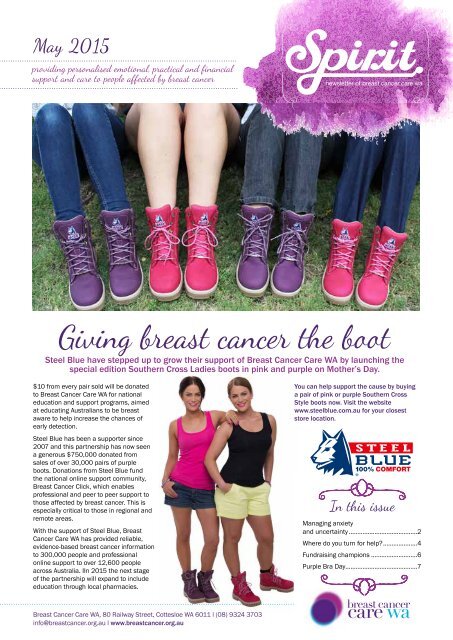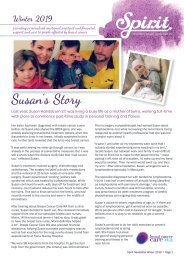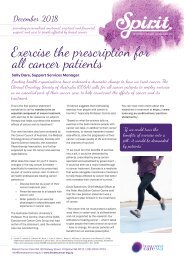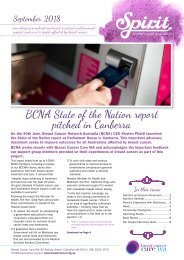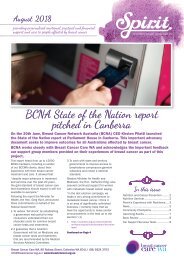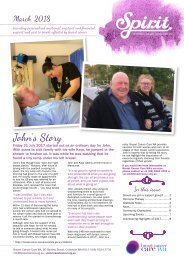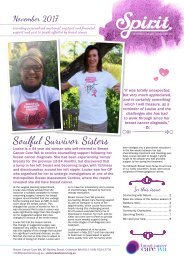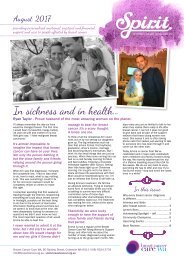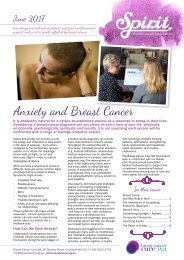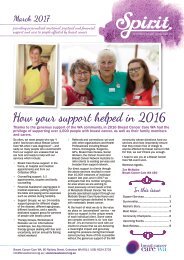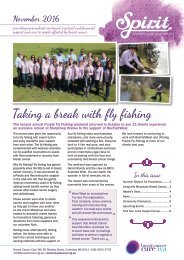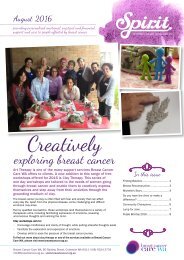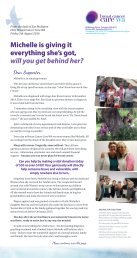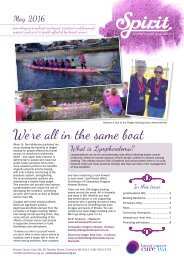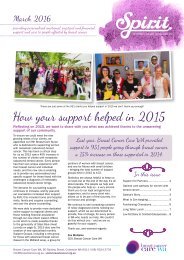Spirit Newsletter May
Quarterly updates on Breast Cancer Care WA services, events and activities.
Quarterly updates on Breast Cancer Care WA services, events and activities.
You also want an ePaper? Increase the reach of your titles
YUMPU automatically turns print PDFs into web optimized ePapers that Google loves.
<strong>May</strong> 2015<br />
providing personalised emotional, practical and financial<br />
support and care to people affected by breast cancer<br />
newsletter of breast cancer care wa<br />
Giving breast cancer the boot<br />
Steel Blue have stepped up to grow their support of Breast Cancer Care WA by launching the<br />
special edition Southern Cross Ladies boots in pink and purple on Mother’s Day.<br />
$10 from every pair sold will be donated<br />
to Breast Cancer Care WA for national<br />
education and support programs, aimed<br />
at educating Australians to be breast<br />
aware to help increase the chances of<br />
early detection.<br />
Steel Blue has been a supporter since<br />
2007 and this partnership has now seen<br />
a generous $750,000 donated from<br />
sales of over 30,000 pairs of purple<br />
boots. Donations from Steel Blue fund<br />
the national online support community,<br />
Breast Cancer Click, which enables<br />
professional and peer to peer support to<br />
those affected by breast cancer. This is<br />
especially critical to those in regional and<br />
remote areas.<br />
With the support of Steel Blue, Breast<br />
Cancer Care WA has provided reliable,<br />
evidence-based breast cancer information<br />
to 300,000 people and professional<br />
online support to over 12,600 people<br />
across Australia. IIn 2015 the next stage<br />
of the partnership will expand to include<br />
education through local pharmacies.<br />
You can help support the cause by buying<br />
a pair of pink or purple Southern Cross<br />
Style boots now. Visit the website<br />
www.steelblue.com.au for your closest<br />
store location.<br />
In this issue<br />
Managing anxiety<br />
and uncertainty.........................................2<br />
Where do you turn for help?.....................4<br />
Fundraising champions............................6<br />
Purple Bra Day...........................................7<br />
Breast Cancer Care WA, 80 Railway Street, Cottesloe WA 6011 l (08) 9324 3703<br />
info@breastcancer.org.au l www.breastcancer.org.au
Shelley Long<br />
Counsellor<br />
Managing anxiety and uncertainty<br />
The only constant in life is that it will evolve and change. Try as you may to control the future, sometimes<br />
all you can do is trust that whatever happens, you can adapt and make the best of it.<br />
Demanding certainty and predictability is a very future- focused task, as is worrying. Try instead to<br />
recognise or acknowledge your worries and concerns and accept uncertainty as an inevitable part of life.<br />
By letting go of these concerns you are being more present- focused rather than future-focused.<br />
Following are some techniques that you might find useful:<br />
• Replace expectations with plans<br />
When you form expectations, you’re setting yourself up for<br />
disappointment. You can guide your tomorrow, but you can’t<br />
control the exact outcome. Instead of expecting the future to<br />
give you something specific, focus on what you’ll do to create<br />
what you want to experience.<br />
• Prepare for different possibilities<br />
The most difficult part of uncertainty is the inability to plan<br />
and feel in control. But you can plan for the possibilities.<br />
• Become a feeling observer<br />
“It isn’t the uncertainty that bothers me; it’s my tendency to<br />
get lost in my feelings about it.”<br />
Speculation leads to feelings, which can lead to more<br />
speculation and then more feelings. It helps to stop the<br />
cycle by recognising the feeling—in this case, fear—and then<br />
reminding yourself, you can’t possibly predict the future, but<br />
you can help create it by fostering positive feelings about<br />
the possibilities.<br />
• Get confident about your coping and<br />
adapting skills<br />
This isn’t the same as “expect the worst.” It’s more about<br />
assuring yourself that you can handle any difficulty that<br />
might come.<br />
• Utilise stress reduction techniques<br />
pre-emptively<br />
If you’re dealing with anxiety, you probably have stress in<br />
your body, even if it’s not at the forefront of your thoughts in<br />
this exact moment. Over time, that body stress affects blood<br />
pressure, blood sugar, muscle tension, cholesterol level,<br />
breathing rate and every organ in your body.<br />
Incorporate stress reduction techniques into your day, ideally<br />
meditation, even if just five to ten minutes daily. Finding your<br />
centre will help you feel better prepared to tackle whatever<br />
comes your way.<br />
“Uncertainty is the only certainty<br />
there is and knowing how<br />
to live with insecurity is the<br />
only security.”<br />
~John Allen Paulos<br />
• Focus on what you can control<br />
Oftentimes, we overlook the little things we can do to make<br />
life easier while obsessing about the big things we can’t do.<br />
• Practice mindfulness<br />
When you obsess about a tomorrow you can’t control,<br />
you’re too busy judging what hasn’t happened yet, to fully<br />
experience what’s happening right now. Instead of noticing<br />
and appreciating the beauty in the moment, you get<br />
trapped in a fear-driven thought cycle about the potential for<br />
discomfort down the line.<br />
While meditation is the best way to become more mindful, it<br />
isn’t the only approach. So you can’t yet plan for tomorrow—<br />
that doesn’t have to be a bad thing. That means you can<br />
spend today doing other things that you enjoy.<br />
• Talk to someone<br />
Speak to a trusted friend or relative or use the Breast Cancer<br />
Care WA counselling service, Cancer Council service or ask<br />
your GP for a referral to a clinical or counselling psychologist.
Chemotherapy–induced<br />
peripheral neuropathy<br />
Peripheral neuropathy is a condition that is caused by damage to the<br />
nerves that are further away from the brain and spinal cord; these<br />
nerves are known as peripheral nerves. These nerves carry sensations<br />
to the brain and assist with control of our arms and legs.<br />
Diane Grennan<br />
Breast Care Nurse<br />
Chemotherapy–induced neuropathy occurs as a result of the chemo drugs causing either a<br />
direct harmful effect on the brain itself or the peripheral nerves, (Argyriou, A.A , et al, 2011).<br />
This condition can be one of the most severe, adverse<br />
effects of chemotherapy treatment and can be quite<br />
debilitating for many people, with a huge impact upon their<br />
quality of life. Unfortunately symptoms can persist long<br />
after completion of treatment, with some people finding<br />
that their symptoms slowly improve as the nerve recovers,<br />
yet for some people the damage will be permanent<br />
and they will need to find ways to adapt and cope with<br />
the changes.<br />
Symptoms are dependent on which nerves<br />
are involved and can include:<br />
• Pain which may be there all of the time or may come<br />
and go and can be mild or severe<br />
• Burning sensation<br />
• Tingling like pins and needles<br />
• Loss of feeling/numbness<br />
• Problems with picking up/holding items using fingers<br />
• Balance issues<br />
• Sensitivity to temperatures and pressure so that even<br />
the lightest touch can be painful<br />
• Feeling dizzy or lightheaded when sitting or standing<br />
• Constipation/feeling bloated<br />
If you develop any of the symptoms of chemotherapy–<br />
induced neuropathy, the first thing to do is to let your<br />
health care team know so that they can perform a clinical<br />
assessment and determine how much your nerves are<br />
affected. They can then decide whether to continue the<br />
current treatment regime, reduce the drug and give smaller<br />
doses over a longer period of time, or stop the medication<br />
until symptoms improve and then re-start again.<br />
Treatment is usually aimed at relieving the pain and<br />
discomfort that can occur with this condition.<br />
Some of the medications used are:<br />
• Steroids for short term use to try and relieve some<br />
of the nerve inflammation<br />
• Skin patches or creams that can be used directly<br />
over the painful area<br />
• Anti-depressant medication which can reduce<br />
the nerve pain<br />
• Anti-convulsant medications which are used to treat<br />
many types of nerve pain<br />
• Stronger pain medication for when the pain<br />
becomes severe<br />
Other health care professionals that may<br />
be able to assist are:<br />
• Hospital based pain team<br />
• Physiotherapy – they can offer advice and treatment<br />
for coordination and balance and may also discuss<br />
whether using a TENS machine (transcutaneous<br />
electrical nerve stimulation) may be of benefit.<br />
• Occupational Therapy – they can assess and offer<br />
advice on appropriate aids and equipment to assist<br />
you carry out your usual daily tasks, and provide<br />
information on organizations where these aids can<br />
be either purchased or loaned.<br />
The effect of chemotherapy–induced neuropathy can<br />
vary greatly from person to person, and so will how much<br />
practical and emotional support is needed. People may not<br />
suffer with many symptoms whilst others may experience<br />
many more challenges and difficulties. The most important<br />
thing to remember is that you do need to discuss any<br />
concerns with your treating team as soon as possible.<br />
They will be then be able to look at a suitable management<br />
plan and referral to other health care professionals as<br />
appropriate.<br />
References<br />
Andreas A.A, Athanasios, P. K, Makatsoris, T & Kalofonos, H. Chemotherapy-induced peripheral neuropathy in adults:<br />
a comprehensive update of the literature. Cancer Management Research, 2014, 6, 135-147<br />
Tofthagen, C, Gonzalez, L, Visovsky, C & Akers, A. Self-management of Oxiplatin – Related Peripheral Neuropathy<br />
in Colorectal Cancer Survivors. Chemotherapy Research and Practice, 2013.<br />
<strong>Spirit</strong> <strong>Newsletter</strong> <strong>May</strong> 2015 l Page 3
Donna,<br />
a survivor of breast cancer<br />
Your mum is 12,000 kilometres away,<br />
you have a toddler, a tiny baby<br />
and you’ve just been told you have<br />
breast cancer . . .<br />
… where do you turn for help?<br />
This is where young mum Donna found herself when<br />
she was diagnosed with breast cancer early last year.<br />
Just weeks after her baby boy Hudson arrived safely she<br />
found a distinct lump in her breast and asked her GP<br />
about it. She was assured, ‘Everything should be fine…it’s<br />
probably a blocked milk duct.’ But the doctor sent her for<br />
an ultrasound just to be sure.<br />
A week later Donna was given the terrifying diagnosis<br />
- triple negative breast cancer. She had just six days to<br />
wean her breastfeeding baby before surgery and the<br />
whirlwind of gruelling cancer treatment began.<br />
“I remember the ultrasound examination like it was<br />
yesterday. I could just tell something wasn’t right by the<br />
sonographer’s body language. He was biting his lip and<br />
kept going over the same area again and again. Then I<br />
heard those frightening words, “Is anyone with you?”<br />
A week later I found myself sitting in my surgeon’s office<br />
being told “It’s breast cancer”.<br />
It was the last thing I expected at 33. I had a 14 week old<br />
who was breastfeeding, a 3 year old who had just started<br />
kindy and my hubby had just started a new job so the<br />
timing was terrible.<br />
Although I had the support of my in-laws all my family<br />
were still living in the UK so I felt awfully homesick.<br />
I was so overwhelmed I didn’t know what to do.<br />
Then a friend of mine sent me the link to Breast<br />
Cancer Care WA. I sent an email straight away. I heard<br />
back from Moira, a breast care nurse who arranged to<br />
come and see me within a few days.<br />
Moira was fantastic, giving me lots of information and<br />
guidance prior to my surgery. She also put me in touch<br />
with a lady who had been through the same experience.<br />
It all happened so fast, I was operated on within a week.<br />
I had a mastectomy and full axillary clearance.<br />
The hardest thing for me was the 7 night stay in hospital,<br />
having my boys visit me and then go home again leaving<br />
me alone and my mum being so far away. Following<br />
surgery I faced 8 sessions of chemo once a fortnight and<br />
then 5 weeks of radiotherapy.<br />
Then, even before my treatment was completed, I was hit<br />
with another bombshell in September. My dear mum was<br />
diagnosed with lung cancer and died just six weeks later.<br />
I was completely devastated.<br />
My counsellor Aileen from Breast Cancer Care WA really<br />
has a heart of gold, always showing me such compassion<br />
and empathy. She’s been there for me in person, on<br />
the phone or email providing emotional support, coping<br />
strategies and a shoulder to cry on, often crying together<br />
with me. Thank goodness for this great charity, which<br />
made such a difference to my family in 2014.<br />
Thank you to everyone who supports Breast Cancer Care<br />
WA, I don’t know how I would have made it without them!”<br />
Every year we are seeing more and more people just like<br />
Donna, of all ages facing the battle of breast cancer. All<br />
the support we provide to them is free of charge. But that<br />
support is limited to the funds we have on hand from the<br />
donations we receive from our supporters.<br />
Nobody deserves the pain, stress and worry that breast<br />
cancer brings. They deserve all the emotional, practical<br />
and financial support, pampering, care and friendship<br />
To donate today, please visit<br />
www.breastcancer.org.au or phone (08) 9324 3703.
News<br />
Clarisse Jennings<br />
Volunteer librarian,<br />
breast cancer survivor<br />
and spiritual healer<br />
From the<br />
Library<br />
“Mummy is Getting Better!”<br />
By Maria Theochari<br />
This well written and easy to comprehend paperback<br />
book is suitable and reassuring for the younger child.<br />
It gives basic information of how family life could be<br />
temporally altered from their usual day to day routine.<br />
Bright and delightful colourful illustrations are guaranteed<br />
to capture the interest of both young and old, as well as<br />
giving hope as is portrayed on the last page.<br />
This valuable resource also would be very beneficial for<br />
those adults who have the task of informing young ones<br />
when a loved member of the family has been faced with<br />
a cancer diagnosis.<br />
You can access this and hundreds of other free resources<br />
from our library located at our Cottesloe office.<br />
50th Birthday<br />
Celebrations for Janice<br />
Can’t believe that I made it! Almost three years ago I was<br />
diagnosed with breast cancer and then a year later I had a<br />
second mastectomy. At that stage I thought I would never<br />
recover and yet here I am loving life!<br />
After my treatment finished in November 2013 I decided<br />
to return to Scotland for a time to catch up with family and<br />
friends. As my birthday approached in November I began to<br />
reflect on what would make me happy at this time of my life.<br />
The answer? I asked family and friends to give me donations<br />
to charity rather than birthday presents. The donations,<br />
however much, to be split between Breast Cancer Care WA<br />
and Maggie’s, Inverness.<br />
My thanks go to both these organisations and the people<br />
in them who have helped me with words of kindness, care<br />
compassion and even laughter along what has been a<br />
difficult journey. My wish would be that my donations help<br />
someone else with a cancer diagnosis to ease their pain<br />
and suffering in some small way.<br />
Cathie, Aileen and the team in Breast Cancer Care WA and<br />
Jane, Carol and folks in Maggie’s, Highland, I am and always<br />
will be, in your debt.<br />
My best wishes from a very young at heart<br />
50 year old! Janice<br />
My Mandala<br />
As I meditate I see a pale mist of nothingness<br />
morphing into the different colours of my soul.<br />
They twirl and swirl like balls of mystical smoke<br />
above an aqua fire helping me view my past and<br />
future. The green of nature to ease my pain, the<br />
happiness of yellow I feel when a treatment is<br />
successful, the pink and purple supporting me<br />
to live beyond my cancers, all are encompassed<br />
by a hug of orange that echoes resilience. Slowly<br />
I return to reality and notice these colours are<br />
reflected in my daily medications that make<br />
today a great day to be alive.<br />
Carol Westwood<br />
A member of the Secondary Breast Cancer Support Group<br />
We help our clients to work through their breast<br />
cancer journey in a variety of different ways that are<br />
personalised to their needs. Carol started art therapy<br />
with our counsellor Linda and along with her painting,<br />
chose to express her emotions via this poem. It came<br />
to her while eating a bacon and egg sandwich and<br />
attempting to read a novel.<br />
<strong>Spirit</strong> <strong>Newsletter</strong> <strong>May</strong> 2015 l Page 5
Fundraising Champions<br />
We are incredibly grateful to receive the support from the WA community who organise events of all<br />
different shapes and sizes. This continuous show of support helps us to assist so many women, men<br />
and their families affected by breast cancer and we are pleased to share some stories about these<br />
community events.<br />
If you would like to host your own fundraising event or activity we would love to hear from you on<br />
9324 3703 or fundraising@breastcancer.org.au.<br />
Breastfed at The Standard<br />
Thank you to the team at The Standard for hosting the inaugural Breastfed fundraising event on Sunday April 19. Mother Nature<br />
smiled on us as ladies sipped rosé and enjoyed gourmet canapés in the garden. The charismatic and fabulous Mel Del Popolo<br />
generously donated her time to MC the event and kept everyone entertained.<br />
The event raised $4500 for Breast Cancer Care WA. An outstanding result for which we are so grateful.<br />
Upcoming Fundraisers<br />
Raffle<br />
The Breast Cancer Care WA Raffle is back and this year will run<br />
throughout <strong>May</strong> and June. At just $3 a ticket and with exciting<br />
prizes up for grabs, everyone will want to snap up a few tickets.<br />
1st Prize – Piaggo Zip Scooter<br />
2nd Prize – 3 Oceans Wine for a Year<br />
Can you help us by selling tickets amongst your friends and<br />
family or in your workplace?<br />
If 500 people can sell one book of 25 tickets each, you can help<br />
raise an amazing $37,500. It’s that simple!<br />
Contact Emma on 9324 3703 or Emma@breastcancer.org.au<br />
to find out more
Boobalicious Ball<br />
The 12th annual adultshop.com Boobalicious Ball is back for<br />
an evening that will mesmerise, inspire and entertain! Having<br />
raised over $1 million to date, this fantastic evening exists to<br />
raise vital funds for Breast Cancer Care WA. With its signature<br />
lingerie and fantasy show, live music, delicious three course<br />
meal, endless beverages, spirited live and silent auctions and<br />
one of Perth’s richest raffles, Boobalicious is a do not miss<br />
occasion for everyone.<br />
Find out more and book tickets at www.boobalicious.com.au<br />
Sneak out to the Speakeasy for<br />
a wonderful night at the Cotton<br />
Club. Enjoy canapés, raffles and<br />
the 1920’s style at the Wolf Lane<br />
bar with part proceeds going to<br />
Breast Cancer Care WA.<br />
Tickets are $80. To book email<br />
elevationevents@hotmail.com<br />
Jump for Jane<br />
Save the Date Saturday 24 October 2015<br />
For its third year we bring you Jump for<br />
Jane with an exciting new location flying<br />
over Rockingham Beach. Take the leap<br />
and raise vital funds during breast cancer<br />
awareness month.<br />
If you would like to be notified<br />
when registrations launch contact<br />
Jo on 9324 3703 or<br />
fundraising@breastcancer.org.au<br />
<strong>Spirit</strong> <strong>Newsletter</strong> <strong>May</strong> 2015 l Page 7
Hands Up<br />
It doesn’t take much to make a difference and create<br />
a long, lasting change that will impact the lives of<br />
others. At the recent Long Table Lunch, all it took was<br />
for people to put their hands up.<br />
When 64 people raised their hands to make a pledge supporting<br />
Breast Cancer Care WA, they raised over $70,000 in just 10<br />
minutes to help fund the extensive range of services and<br />
personalised support available. In 2014 our Breast Care Nurses<br />
and Counsellors in the Support Services Team provided 6,192<br />
instances of emotional support, a 41% increase on the year<br />
before and this number is expected to increase again for 2015.<br />
Regular monthly pledges are a fantastic way to enable us to plan<br />
and meet this increase in demand. But we need your help.<br />
Imagine if just 100 of our <strong>Spirit</strong> readers could raise their hands<br />
and make a $20 pledge each month? The collective result could<br />
make an enormous difference.<br />
What are regular monthly pledges?<br />
Regular monthly pledges are a great way people can help us<br />
build a regular flow of income we can depend on that can<br />
help us to better plan and sustain key program and services.<br />
Pledges start from as little as $5 per month you can imagine the<br />
Aileen thanks individual pledgers<br />
difference 200 pledges at $5 a month would mean to us.<br />
Pledges are easy to set up, they are tax deductable and will help<br />
make a difference for so many West Australians affected by<br />
breast cancer.<br />
To pledge please visit www.breastcancer.org.au or email<br />
kathy@breastcancer.org.au . Once pledges are made,<br />
they are easy to adjust at any time.<br />
A Celebration of Women<br />
In March 2015, the Celebration of Women Long Table Lunch saw the fantastic, ongoing<br />
sponsorship from many suppliers, who provided infrastructure, entertainment and the<br />
delicious luncheon – our special thanks to each and every one of you. We also had<br />
the privilege of working alongside an amazing team of 185 volunteers who brought<br />
together this signature event with 1,299 hours of donated time and who kept on smiling<br />
throughout the entire weekend! Special mention and thanks also go to the personnel<br />
of HMAS Stirling, who volunteered for the 7th year and to the phenomenal chef team.<br />
Their food wowed our guests and they had great fun too – a couple have already put<br />
their hands up for 2016, which is the best feedback we can have!<br />
We simply could not make this event happen without<br />
the incredible and humbling support of the amazing people of WA<br />
– suppliers, volunteers and most importantly; our guests. Thanks to you,<br />
over $300,000 has been raised<br />
Breast Cancer Care WA<br />
80 Railway Street, Cottesloe WA 6011<br />
(08) 9324 3703<br />
info@breastcancer.org.au<br />
www.breastcancer.org.au


